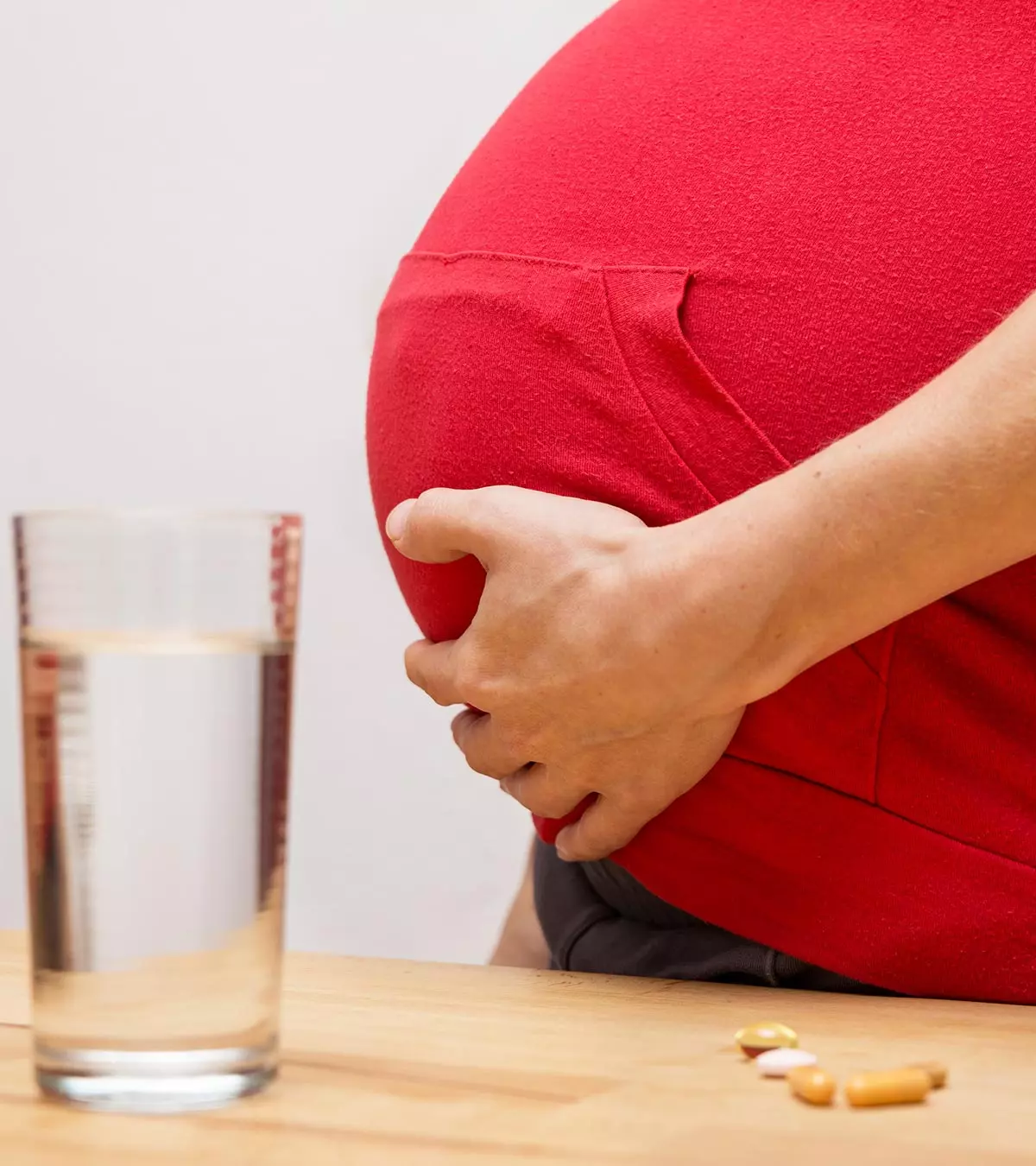
Image: Shutterstock
Glucosamine is a natural substance present in the body that supports the formation of cartilage, ligaments, and tendons, and is found in the fluid that cushions our joints. Therefore, glucosamine supplements are used to manage conditions such as osteoarthritis, rheumatoid arthritis, and multiple sclerosis (1).
However, you should consult with your doctor before using glucosamine when pregnant. Pregnancy may change the way most substances react in the body. Moreover, some supplements or medications may not be safe for the growing fetus.
Glucosamine may confer some benefits by improving joint health, but is it safe for pregnant women? Continue reading this post, which explains whether the consumption of glucosamine supplements during pregnancy is safe and its potential side effects.
Key Pointers
- Glucosamine is a supplement that manages osteoarthritis and other joint-related conditions.
- Research on glucosamine use during pregnancy is limited, and its safety is uncertain.
- A scientific study found no increase in the risk of adverse fetal outcomes with glucosamine use during pregnancy.
- The recommended daily dosage of glucosamine is 1500mg.
- Glucosamine can cause general side effects such as allergy, stomach cramps, diarrhea, nausea, and constipation.
Can You Take Glucosamine During Pregnancy?

Image: Shutterstock
There is no sufficient information regarding the safety of glucosamine during pregnancy. A study conducted on pregnant women by the University of Toronto stated that there was no increased risk of major malformations or other adverse fetal effects on using glucosamine during pregnancy (2). The research report also stated that this study utilized limited data, and may have limitations.
The research paper ‘Over-The-Counter Medications in Pregnancy,’ observes that “glucosamine use by pregnant women with painful arthritis appears to be safe.” It also cited a study among 54 women where only one major malformation was found, and other birth defects such as stillbirth, abortion, preterm birth, or other maternal morbidity were not found (3).
However, as there are no well-controlled studies to determine the safety of glucosamine supplements during the prenatal period, you should take them only under the supervision of your doctor.
 Point to consider
Point to considerWhat Is The Recommended Dosage Of Glucosamine During Pregnancy?

Image: Shutterstock
The general recommended dosage of glucosamine is 1500mg per day. Since different brands have different concentrations of glucosamine, you should read the labels carefully before consuming the supplements (4). Also, the dosage may or may not vary for pregnant women, and you must consult your Ob/Gyn before consuming the medicine.
What Are The Side Effects Of Glucosamine During Pregnancy?
There are no adequate studies to determine the risks of glucosamine use during pregnancy on the baby. However, here are some general side effects of glucosamine on the user (4).
- If the supplement is made from shellfish, then there is a possibility of triggering an allergic reaction if you are allergic to shellfish.
- Stomach cramps

Image: Shutterstock
- Diarrhea and nausea
- Constipation
- Glucosamine is a type of sugar, so seek a doctor’s advice before taking it if you have diabetes. Gestational diabetes is found in about 2% to 10% of all pregnant women annually, as reported by the US National Institute of Diabetes and Digestive and Kidney Diseases.
 Point to consider
Point to considerFrequently Asked Questions
1. Does glucosamine affect fertility?
There is no clear data available on the impact of glucosamine on fertility. A few studies on humans and animals have shown that glucosamine can inhibit decidualization of the endometrium (changes in the lining of the uterus for implantation). If the endometrial lining is not ideal for pregnancy implantation, the fertilized ovum may not implant, and conception may not occur (6). However, more research is needed to establish a correlation.
2. Can I take glucosamine when trying to conceive?
You may avoid glucosamine if you are planning to conceive. Studies on animals show a possibility of congenital anomalies and reduced fetal size associated with glucosamine intake. This may also increase the risk of developing gestational diabetes (7).
3. Who should not take glucosamine?
Those with asthma, diabetes, high cholesterol, high blood pressure, and glaucoma should avoid using glucosamine since it can worsen these conditions. Glucosamine can be produced from the shells of lobsters, crabs, or shrimps. So people with a shellfish allergy should avoid it (1).
4. Can glucosamine cause weight gain during pregnancy?
Animal studies have shown that glucosamine can cause body weight gain due to a reduction in insulin response. The outcome may vary depending on the diet and other lifestyle factors (8)
5. Can glucosamine make me bloated?
Most people tolerate glucosamine well. However, it may cause stomach cramps and bloating in some people. These effects may vary depending on your health status and doses, so you may ask your healthcare provider for a more personalized opinion (9).
During pregnancy, any supplement or medication needs to be taken with caution. Although consumption of glucosamine when pregnant is not likely to show any major adverse effects, there is a lack of proper research and data about its safety and efficacy (2) (5). Therefore, if you suffer from pain or arthritis problems, consult your doctor before planning to take glucosamine supplements. Inform your doctor about your current medications, pre-existing health conditions, and any concerns about managing joint pain. This will help them suggest the right dosage and effective alternatives and minimize the risk of side effects like diarrhea, allergies, or heartburn.
Infographic: Possible Adverse Effects Of Glucosamine During Pregnancy
Ideally, when you are pregnant, you should take glucosamine only when suggested by your doctor for health reasons. However, when taking the supplements, watch out for any side effects, as this infographic mentions, and report to your OB-GYN to avoid further complications. Illustration: Momjunction Design Team
This post is for informational purposes only and is not a replacement for a doctor’s consultation. Do not use any medication without talking to your doctor.
Illustration: Is It Safe To Use Glucosamine When Pregnant?

Image: Dall·E/MomJunction Design Team
References
1. Glucosamine sulfate; Medline Plus; US National Library of Medicine
2. Sivojelezova A, Koren G, Einarson A; Glucosamine use in pregnancy: an evaluation of pregnancy outcome; NCBI (2007)
3. Jessica Servey M.D, Jennifer Chang M.D; Over-the-Counter Medications in Pregnancy; American Academy of Family Physicians
4. Glucosamine; Health navigator New Zealand
5 Glucosamine; My Health Kementerian Kesihatan Malaysia
5. Jui-He Tsai, et al; Glucosamine Inhibits Decidualization of Human Endometrial Stromal Cells and Decreases Litter Sizes in Mice; NCBI (2013)
6. Glucosamine study raises fertility concerns; Stories Of Australian Science
7. Ji-Sun Hwang, et al; Glucosamine enhances body weight gain and reduces insulin response in mice fed chow diet but mitigates obesity, insulin resistance and impaired glucose tolerance in mice high-fat diet. NCBI (2015)
8. Glucosamine Chondroitin; University of Wisconsin Integrative Medicine
Community Experiences
Join the conversation and become a part of our nurturing community! Share your stories, experiences, and insights to connect with fellow parents.
Read full bio of Dr. Anita Gupta
Read full bio of shreeja pillai
Read full bio of Rebecca Malachi
Read full bio of Dr. Joyani Das



















